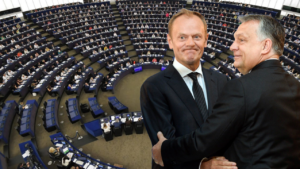INTRODUCTION
In the labyrinthine corridors of European politics, migration has emerged as the epicentre of a seismic revolt shaking the foundations of the European Union. The very essence of European unity and solidarity is being put to the test as member states clash over the contentious issue of immigration. At the forefront of this rebellion stand Hungary and Poland, two nations defiantly challenging Brussels’ authority and asserting their sovereignty in the face of what they perceive as an overbearing immigration policy imposed by the EU.
Adding to the complexity of this debate is the recent passage of a new pact by the European Parliament, mandating the equitable distribution of asylum seekers among member states. While parliamentarians supported this pact, it has drawn sharp criticism from European citizens across the continent. Many Europeans feel that the pact fails to address fundamental concerns about the impact of unchecked migration on their societies.

One prevailing sentiment among citizens is the belief that migrants do not sufficiently integrate into European culture or respect European values. Instead, they demand that Europeans accommodate their own cultural and religious practices, often at the expense of traditional European norms. Furthermore, there is growing frustration that migrants primarily seek to benefit from Europe’s economic system without contributing to it. Instances of migrant involvement in criminal activities, as seen in countries like Sweden, only exacerbate these concerns.
Against this backdrop, there is a resounding call for European governments to prioritize the needs and interests of their citizens. With ageing populations and declining birth rates, many Europeans fear that they will be replaced by migrants in their own countries. Governments are urged to support policies that promote native population growth and economic prosperity, rather than prioritising the accommodation of migrants at the expense of their own citizens’ well-being.

Defiance in the Face of Brussels’ Mandate
The recent EU vote on a new pact mandating the equitable distribution of asylum seekers among member states has ignited a fierce standoff. Under this pact, any member state refusing to accept its allocated share of migrants faces hefty fines, a prospect vehemently opposed by Hungary and Poland. Their swift declaration of non-compliance has set the stage for a collision with Brussels, highlighting the deep-seated divisions within the EU on immigration policy.

Tusk and Orbán Unite Against EU Immigration Edicts
Former European Council President Donald Tusk once considered a staunch advocate for European integration, now finds himself at odds with the EU establishment as he stands shoulder to shoulder with Hungarian Prime Minister Viktor Orbán in defiance of the immigration edicts emanating from Brussels. This unlikely alliance underscores the depth of discontent among certain member states and the growing disillusionment with the EU’s handling of migration.

Sovereignty vs. Solidarity: The Crux of Dissent
Central to the dissent is the question of sovereignty versus solidarity. While some member states baulk at the idea of shouldering the burden of asylum seekers, others argue for a collective responsibility to manage migration flows. The plight of countries like Greece and Italy inundated with arrivals underscores the urgency of finding a unified approach. However, the lack of consensus among member states only serves to deepen the rift within the EU and threatens to undermine the very notion of European solidarity.

Unity vs. Division: A Fundamental Question for the EU
Ultimately, the revolt led by Hungary and Poland against Brussels is not merely a clash of ideologies but a manifestation of the European project’s profound challenges. As the EU grapples with the fallout from this rebellion, the fundamental question of unity versus division looms larger than ever, casting a shadow over the future of European integration and laying bare the fragility of the EU’s immigration policies.

For a deeper dive into the complexities of Europe’s immigration revolt and its implications, consider watching [Europe’s Immigration Revolt: Hungary and Poland Against Brussels] for more information.
